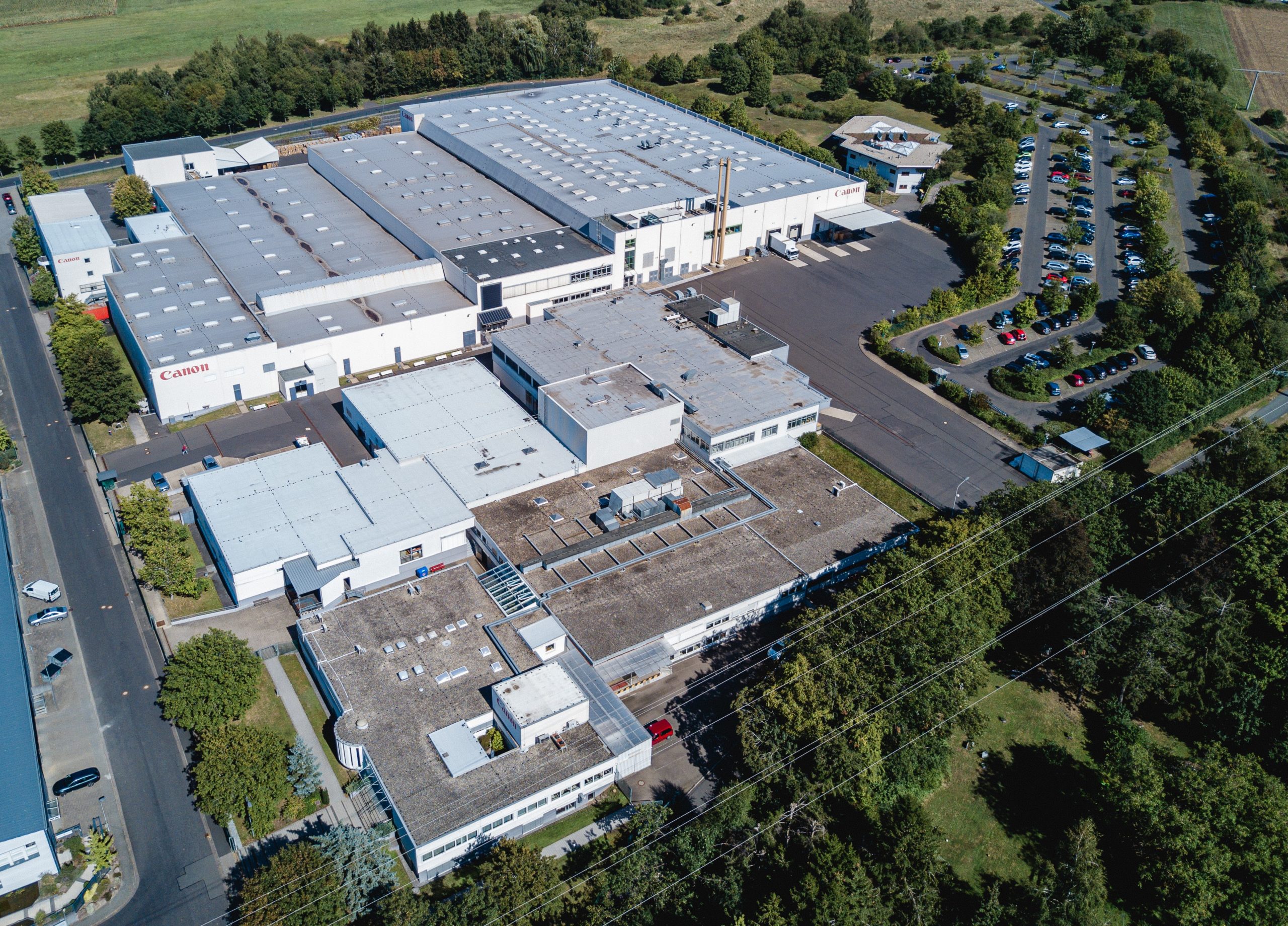On 12 July 2023, Canon Europe invited analysts to attend a briefing and tour of its centre of excellence for sustainability for Europe in Giessen, Germany. The event highlighted Canon’s commitment to circularity, remanufacturing and refurbishment, which it has undertaken since 1998. As organisations increasingly scrutinise print manufacturers’ environmental credentials, Canon is well positioned to respond to the growing need for suppliers to deliver products and services that minimise environmental impact.
Canon’s approach to circularity
Canon’s sustainability strategy is based on the Kyosei philosophy, which translates as ‘living and working together for the common good’. It seeks to create a society in which people and nature can live in harmony. The Kyosei philosophy is reflected in all aspects of the company’s sustainability strategy. For example, Canon’s remanufacturing and refurbishment programmes seek to reduce waste and protect the environment while also providing customers with high-quality, more sustainable products with longevity.
The Giessen site exemplifies this in every detail. For example, grass on the verges grows freely to encourage wildlife and reduce ground temperatures. Every thought is given to efficiency – before, during and after a device arrives to be rejuvenated. The facility is dedicated to reusing as many components as possible from the multifunction devices it receives – with any components that can’t be reused being recycled and replaced with brand new Canon genuine service parts.
A long heritage in remanufacturing
Remanufacturing is a process that leads to a device becoming ‘as good as new’. This is in contrast to refurbishing devices, which are branded as “certified used” products.
Canon has undertaken remanufacturing of used multifunction devices since 1998. Giessen is one of its four global sites supporting refurbishment and remanufacturing. Founded in 1972, Canon Giessen, occupies over 87,400 square meters and employs 300 skilled personnel dedicated to various remanufacturing, refurbishment and pre-delivery activities. Canon Giessen reached carbon neutral status in 2021.
Since 2008, Canon has used these sites to take 44,343 tons of plastics from used products for recycling as raw materials. It has also reused 35,216 tons of products and parts directly. Canon Giessen is ISO14001 and 9001 accredited, meaning the site complies to international environmental and quality management standards.
Canon explained how remanufactured products go through the same rigorous procedures as newly manufactured products. First, the machine’s hard disk drive is securely erased and reset to its original state. Following this, every returned machine is disassembled so that Canon specialists can evaluate every component. Components suitable for reuse are carefully cleaned using industrial wet and dry techniques and thoroughly tested. This may be done by a specially designed robot methodically working its way round the more complex components with a brush. As they are re-assembled, new parts are inserted where the original is worn out or below our quality expectations.
Once the re-build is complete, a rigorous process of testing and quality control begins. Every remanufactured model is equipped with new manuals, user documentation and given a new serial number (alongside the original) – with the warranty conditions being equivalent to a new device. From the customer perspective, the only real difference is a lower price and, the limited range of models presently offered.
Currently, only the imagerunner Advance series can be remanufactured at Giessen. However, a much wider range of devices can be refurbished. An example of a refurbished range is Canon’s new Certified Used (CU) range. This allows for an ever-expanding range of models, including Canon’s imageRUNNER ADVANCE Generation 3 and its imageRUNNER ADVANCE DX ranges (2020 models), to be refurbished in local markets with the support of carefully validated sites.
Only devices with a perfect service history qualify for refurbishment. And only genuine parts and consumables are used in the process. This involves deep cleaning and stringent checks to ensure that it has a long a life as possible once back in circulation. Certified Used (CU) devices are presented in perfect external condition and come with individual Canon certification.
A zero-waste approach
Canon addresses sustainability across each step of the process: collating deliveries of devices to reduce mileage travelled, reusing foam packaging where possible and making sure water is used economically and repeatedly for washing down components.
From the moment the device is sourced to the moment it leaves in minimal packaging (possible because the carriers are trained in handling them in a way that renders sheets of single use plastic and excessive foam padding unnecessary), the process is as sustainable as it can be. Nothing is wasted, as evidenced by the range of labelled boxes (nickel, steel, card, paper) for depositing anything that will not go directly into a ‘new’ device. It is common for a single operative to work on a device from arrival to resale, a process that could take anything from half a day to a week.
The imageRUNNER ADVANCE ES range
Today, Canon markets remanufactured devices from the imageRUNNER ADVANCE series under the Refreshed series brand in Japan and under the imageRUNNER ADVANCE ES brand in Europe. The imageRUNNER ADVANCE ES range, launched in April 2023, is the latest addition to Canon’s established portfolio of remanufactured devices. It comprises both colour and black and white options, boasts an improved ratio of at least 90% renewed materials and supersedes the imageRUNNER ADVANCE EQ80 range launched two years ago.
Canon is already seeing an increase in demand for its remanufactured devices, suggesting that the value of their proposition is cutting through. Currently, the main customers for the devices leaving Giessen are from public sector organisations, for example, government and healthcare. The two core propositions available from this site give customers the opportunity to meet any pricing constraints and fulfil any sustainability goals outlined in their procurement processes, without compromising on longevity or quality of device.
Quocirca opinion
As sustainability continues to rise on the business agenda, Quocirca’s research is showing that organisations’ sustainability goals are influencing their choice of print supplier. Meanwhile the EU’s Corporate Sustainability Reporting Directive (CSRD) is set to transform ESG reporting from 2024. It aims to increase an organisation’s trustworthiness in the eyes of stakeholders such as investors, suppliers and customers. These increased regulatory demands, along with increased customer expectations, means that suppliers’ sustainability strategies will come under more scrutiny.
Although Quocirca’s Sustainability Trends Study shows that customers are increasingly considering sustainable print technology, adoption of remanufactured and refurbished devices is relatively low. As customer awareness increases and more manufacturers release remanufactured device ranges, Quocirca expects this will no longer remain the preserve of relatively early adopters or certain verticals where it increasingly becomes a core requirement on RFPs.
With a strongly embedded sustainability strategy across both product development and manufacturing, and a deep focus on product circularity, Canon is well placed to support the sustainability goals of its customers. Canon’s leadership as a technology innovator in the print industry is supported by a long heritage in remanufacturing. With its broad reach across both the consumer and business space, Canon is particularly well positioned to educate the broader market on the benefits of remanufactured products and address more rigorous customer requirements as they race to meet their sustainability targets.
You have Successfully Subscribed!
Stay ahead with industry insights
Receive Quocirca’s latest articles and research updates





